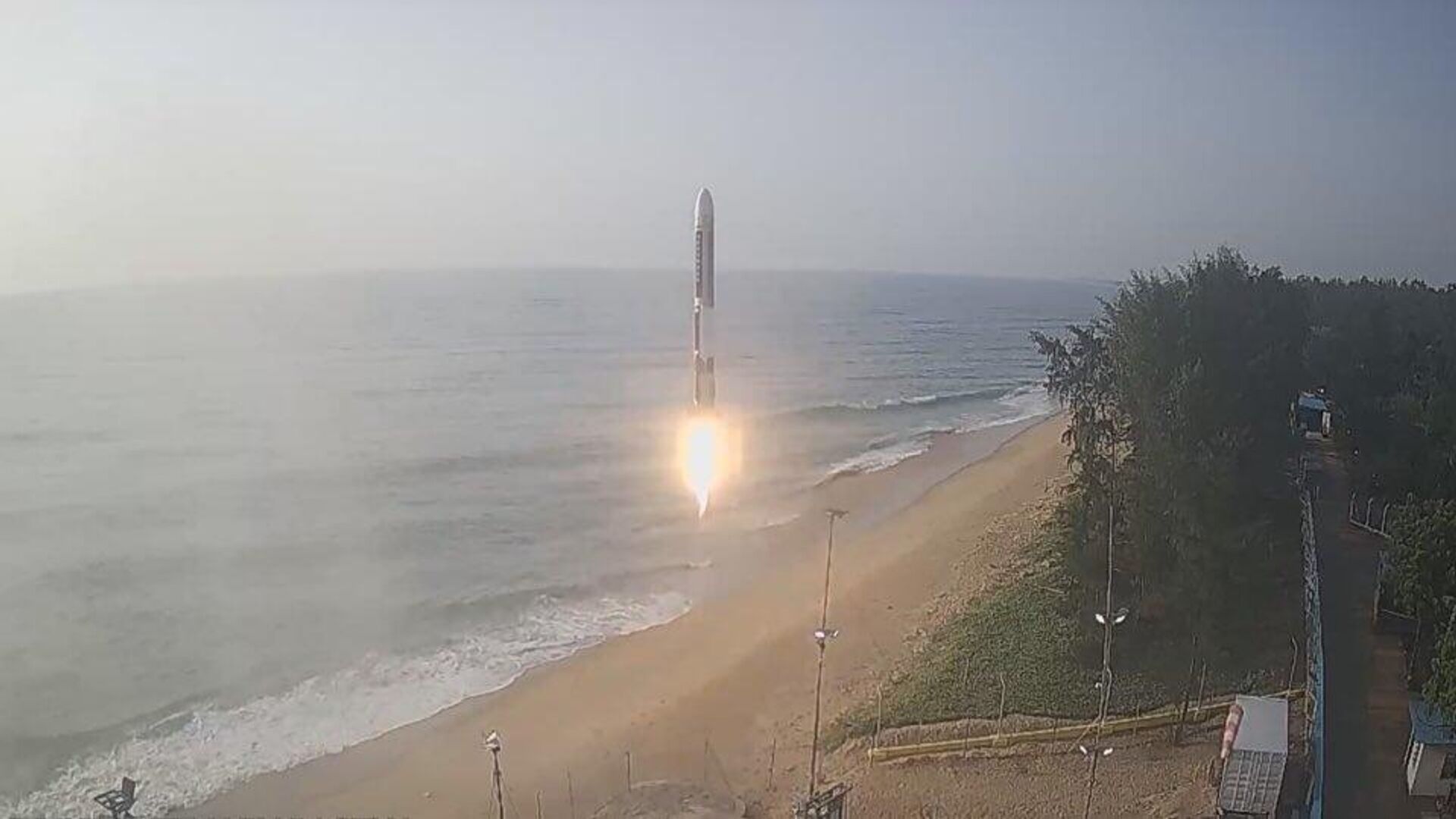https://sputniknews.in/20240530/indian-space-start-up-agnikul-cosmos-successfully-launches-agnibaan-rocket-7482730.html
Indian Space Start-Up Agnikul Cosmos Successfully Launches Agnibaan Rocket
Indian Space Start-Up Agnikul Cosmos Successfully Launches Agnibaan Rocket
Sputnik India
The launch of India’s first semi-cryogenic Agnibaan Suborbital Tech Demonstrator (SOrTeD) rocket has faced several hurdles. Lift-off has been cancelled four times for technical reasons.
2024-05-30T19:33+0530
2024-05-30T19:33+0530
2024-05-30T19:33+0530
science & tech
india
indian space research organisation (isro)
chennai
science & tech
space satellite
space industry
international space station (iss)
space rocket
space exploration
https://cdn1.img.sputniknews.in/img/07e8/05/1e/7483156_33:0:991:539_1920x0_80_0_0_4f763b0725cc9ff1139660e440cf5a50.jpg
An Indian firm has made the first successful launch of its privately-built orbital rocket.Agnikul Cosmos, a space start-up based in Chennai, achieved a significant milestone on Thursday with the successful launch of their 3D-printed, semi-cryogenic Agnibaan Sub-Orbital Technology Demonstrator (SOrTeD) into space.The aerospace company took to X and announced the successful completion of the first flight - Mission 01 of Agnibaan SOrTeD – from India’s first and only private Launchpad within SDSC-SHAR at Sriharikota.Prime Minister Narendra Modi congratulated the company for its feat and wrote on X that the successful launch was a "momentous occasion for India’s space sector and a testament to the remarkable ingenuity of our Yuva Shakti [youth power]."Srinath Ravichandran, co-founder and CEO of Agnikul Cosmos, said in a statement that the launch was the culmination of thousands of hours of reviews and hard work by the team.He also hailed IN-SPACe and the Indian Space Research Organisation (ISRO) for their support in designing and building original space-worthy hardware in India.The rocket is capable of carrying an impressive payload of up to 300 kg to a 700 km-altitude orbit.The Agnibaan launch is seen as a major step forward, as it has an Agnilket semi-cryogenic engine that utilizes a mix of sub-cooled liquid oxygen-based propulsion system developed indigenously.The start-up has fitted the vehicle with a state-of-the-art ethernet-based avionics architecture and fully in-house developed autopilot software, both of which are pioneering advancements by India.
https://sputniknews.in/20240322/how-significant-is-agnibaan-rocket-launch-to-indias-space-exploration-journey-6884939.html
india
chennai
international space station (iss)
Sputnik India
feedback.hindi@sputniknews.com
+74956456601
MIA „Rossiya Segodnya“
2024
Sangeeta Yadav
https://cdn1.img.sputniknews.in/img/07e6/0c/0f/110602_0:0:641:640_100x100_80_0_0_c298016a79eb02ef8caa9d1f688c12a5.jpg
Sangeeta Yadav
https://cdn1.img.sputniknews.in/img/07e6/0c/0f/110602_0:0:641:640_100x100_80_0_0_c298016a79eb02ef8caa9d1f688c12a5.jpg
News
en_IN
Sputnik India
feedback.hindi@sputniknews.com
+74956456601
MIA „Rossiya Segodnya“
Sputnik India
feedback.hindi@sputniknews.com
+74956456601
MIA „Rossiya Segodnya“
Sangeeta Yadav
https://cdn1.img.sputniknews.in/img/07e6/0c/0f/110602_0:0:641:640_100x100_80_0_0_c298016a79eb02ef8caa9d1f688c12a5.jpg
india’s first semi-cryogenic engine, agnibaan sorted, suborbital tech demonstrator, indian space start-up, agnikul cosmos, agnibaan rocket, 3d-printed, semi-cryogenic, sorted, liquid, gas propellant, innovative technology, indian space industry, indian space research organisation, isro, sorted mission, agnilet, oxygen-based propulsion system, avionics architecture, test launch of agnibaan rocket, satish dhawan space centre, isro, private lanchpad, skyroot, vikram-1 rocket, agnibaan rocket, agnikul cosmos, private companies in space sector
india’s first semi-cryogenic engine, agnibaan sorted, suborbital tech demonstrator, indian space start-up, agnikul cosmos, agnibaan rocket, 3d-printed, semi-cryogenic, sorted, liquid, gas propellant, innovative technology, indian space industry, indian space research organisation, isro, sorted mission, agnilet, oxygen-based propulsion system, avionics architecture, test launch of agnibaan rocket, satish dhawan space centre, isro, private lanchpad, skyroot, vikram-1 rocket, agnibaan rocket, agnikul cosmos, private companies in space sector
Indian Space Start-Up Agnikul Cosmos Successfully Launches Agnibaan Rocket
The launch of India’s first semi-cryogenic Agnibaan Suborbital Tech Demonstrator (SOrTeD) rocket has faced several hurdles. Lift-off has been cancelled four times for technical reasons.
An Indian firm has made the first successful launch of its privately-built orbital rocket.
Agnikul Cosmos, a space start-up based in Chennai, achieved a significant milestone on Thursday with
the successful launch of their 3D-printed, semi-cryogenic Agnibaan Sub-Orbital Technology Demonstrator (SOrTeD) into space.
The aerospace company took to X and announced the successful completion of the first flight - Mission 01 of Agnibaan SOrTeD – from India’s first and only private Launchpad within SDSC-SHAR at Sriharikota.
"All the mission objectives of this controlled vertical ascent flight were met and performance was nominal," Agnikul Cosmos posted on its X account. "The vehicle was completely designed in-house and was powered by the world’s first single piece 3d printed engine and also happens to be India’s first flight with a semi-cryo engine."
Prime Minister Narendra Modi congratulated the company for its feat and wrote on X that the successful launch was a "momentous occasion for India’s space sector and a testament to the remarkable ingenuity of our Yuva Shakti [youth power]."
Srinath Ravichandran, co-founder and CEO of Agnikul Cosmos, said in a statement that the launch was the culmination of thousands of hours of reviews and hard work by the team.
He also hailed IN-SPACe and the Indian Space Research Organisation (ISRO) for their support in designing and building original space-worthy hardware in India.
The rocket is capable of carrying an impressive payload of up to 300 kg to a 700 km-altitude orbit.
The Agnibaan launch is seen as a
major step forward, as it has an Agnilket
semi-cryogenic engine that utilizes a mix of sub-cooled liquid oxygen-based propulsion system developed indigenously.
The start-up has fitted the vehicle with a state-of-the-art ethernet-based avionics architecture and fully in-house developed autopilot software, both of which are pioneering advancements by India.



